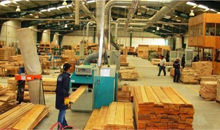UK home furnishings manufacturers upbeat despite Brexit uncertainty
Source:Furniture Today
Following Friday’s EU referendum, in which the British public voted to leave the European Union, UK home furnishings companies are staying cautiously positive about the impact of the vote on their business.

Following Friday’s EU referendum, in which the British public voted to leave the European Union, UK home furnishings companies are staying cautiously positive about the impact of the vote on their business.
“I voted to remain, but now that the dust has settled a bit, I’m quite excited by the opportunities this presents both us as a company and the United Kingdom as a whole,” said Grant Redfern, director of trim manufacturer Trimmings by Design. “While there may be some short-term pain, all will come good in the end.”
The actual impact of Brexit remains unclear. The Government has not yet triggered Article 50, the procedure which enacts a state’s departure from the European Union; Prime Minister David Cameron, who lead the Remain campaign, resigned on Friday; and Labor, the opposition party, is in a state of turmoil after 12 leading members resigned due to leader Jeremy Corbyn’s perceived inaction during the Remain campaign.
Councilor of the Exchequer (equivalent to Secretary of the Treasury) George Osborne had been silent on the result until this morning, while the British Pound fell to a 31-year low against the U.S. Dollar. To date, this was the biggest drop of any currency in a two-hour period.
“Exit from Europe was a surprise,” said Alastair Cumming, Senior Investment Director at Investec Wealth and Investment. “We all believed it would be a narrow vote to remain, and as a result the markets received a big shock on Friday morning.”
He stressed that no action on leaving the EU would be made until at least October, when a new Prime Minister will take David Cameron’s place and take on the responsibility of triggering Article 50. Even when this does happen, Article 50 takes about two years to negotiate. Until then it is not clear what trade deals, border policies, and other negotiations the UK will have with Europe.
Departure from the EU offers a myriad of potential consequences for Britain, but even these are uncertain until Article 50 negotiations take place. Countries such as Norway and Switzerland, for example, are not members of the European Union but maintain close links and trade agreements with it.
But in order to reap these benefits, Britain would need to agree to follow EU employment regulations. Businesses’ contracts with EU suppliers will likely need to change, as they will no longer be subject to European contract law; new duties and tariffs are likely to go into place; skilled European workers will be less inclined to come to Britain. The low value of the Pound will affect pricing of product from overseas suppliers, as Dominic Morgan, managing director of Jim Dickens, points out.
For Mr. Cumming, a speedy negotiation process is crucial. “It’s clear that the MPs have no plan right now, and that’s going to cause a lot of volatility over the next few months,” he said. “We might have business as usual, but there will be no new money, no new staff, no new equipment, no new investment until we know what’s happening.”
In the run-up to the referendum, representatives of more than 1,200 business declared their support for Remain in a letter to the Times newspaper. These included co-founder of furniture company Made.com Brent Hoberman, interior designers Kelly Hoppen and Katherine Pooley, and textile designer Lorna Syson.
The Creative Industries Federation found that 96% of its members backed Remain . Among them, members of the design industry stressed concern about continued access to European markets, with the EU being their largest export market, and the end of freedom of movement. EU citizens have the right to live and work in any other EU country without the need for visas, registration, or paperwork. And the UK design industry is centered on cosmopolitan London, using its international workforce to its creative advantage as well as employing Europeans as conduits to business elsewhere.
But since it is not yet clear what London will negotiate with Brussels, designers such as Squint Limited founder Lisa Whatmough are hoping that a freedom-of-movement deal might still take place.
“We’ll get a freedom of movement deal with Brussels,” she said. “It is at the heart of their agenda, and it’s good for us too. We generally agree that people coming here to work and contribute is a good thing. Half of my team are non-UK born and most of my seamstresses are from Europe.”
Director Grand Redferm of Trimmings by Design does not expect Brexit to have much impact on his business at all. His company manufacturers high-end trims in Britain, and he is confident that the quality of his product is unique enough to “sell themselves” despite potential tariffs in Europe.
In America, where most also predicted a Remain victory, the reaction was for firms to hedge against further decline in the Pound and to seek advice from legal consultants. However, there is little that companies on either side of the pond can do to prepare for a post-EU Britain until at least the start date of Article 50 is known.
A Britain outside of the EU does not worry Mr. Cummings, however. “In the long term, Brexit can be good news for Britain. It is in the Europeans’ interest to give us a good deal in these negotiations. We buy so many of their goods and services,” he said. Ms. Whatmough and Mr. Redfern’s attitudes support this view, both reporting that they’re staying positive and carrying on with business. As Mr. Morgan said: “Our contingency plan is, as always, beautifully designed product.”
In the meantime, the fall in the Pound and the potential loosening of regulation benefits American businesses seeking suppliers in the UK. British-made goods tend to be high-end or luxury items and, according to Mr. Cumming, a drop in these prices is good news all round.
“Our focus will be more on the American market over the next two years. That’s where we saw the growth anyway,” he said.
(Source: Furniture Today Author: Leyla Tattergill)





 沪公网安备31010402003309号
沪公网安备31010402003309号



